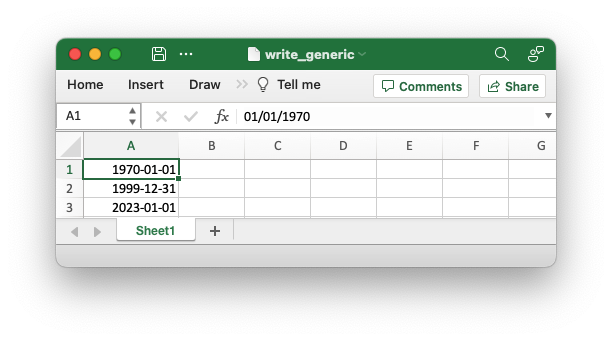Traits: Extending generic write() to handle user data types
Example of how to extend the the rust_xlsxwriterWorksheet::write() method using the
IntoExcelData trait to handle arbitrary user data that can be mapped to one
of the main Excel data types.
For this example we create a simple struct type to represent a Unix Time. This
is the number of elapsed seconds since the epoch of January 1970 (UTC). Note,
this is for demonstration purposes only. The ExcelDateTime struct in
rust_xlsxwriter can handle Unix timestamps.
Image of the output file:

Code to generate the output file:
// SPDX-License-Identifier: MIT OR Apache-2.0
//
// Copyright 2022-2026, John McNamara, jmcnamara@cpan.org
//! Example of how to extend the the `rust_xlsxwriter` `write()` method using
//! the IntoExcelData trait to handle arbitrary user data that can be mapped to
//! one of the main Excel data types.
use rust_xlsxwriter::*;
fn main() -> Result<(), XlsxError> {
// Create a new Excel file object.
let mut workbook = Workbook::new();
// Add a worksheet to the workbook.
let worksheet = workbook.add_worksheet();
// Add a format for the dates.
let format = Format::new().set_num_format("yyyy-mm-dd");
// Make the first column wider for clarity.
worksheet.set_column_width(0, 12)?;
// Write user defined type instances that implement the IntoExcelData trait.
worksheet.write_with_format(0, 0, UnixTime::new(0), &format)?;
worksheet.write_with_format(1, 0, UnixTime::new(946598400), &format)?;
worksheet.write_with_format(2, 0, UnixTime::new(1672531200), &format)?;
// Save the file to disk.
workbook.save("write_generic.xlsx")?;
Ok(())
}
// For this example we create a simple struct type to represent a Unix time.
// This is the number of elapsed seconds since the epoch of January 1970 (UTC).
// See https://en.wikipedia.org/wiki/Unix_time. Note, this is for demonstration
// purposes only. The `ExcelDateTime` struct in `rust_xlsxwriter` can handle
// Unix timestamps.
pub struct UnixTime {
seconds: u64,
}
impl UnixTime {
pub fn new(seconds: u64) -> UnixTime {
UnixTime { seconds }
}
}
// Implement the IntoExcelData trait to map our new UnixTime struct into an
// Excel type.
//
// The relevant Excel type is f64 which is used to store dates and times (along
// with a number format). The Unix 1970 epoch equates to a date/number of
// 25569.0. For Unix times beyond that we divide by the number of seconds in the
// day (24 * 60 * 60) to get the Excel serial date.
//
// We need to implement two methods for the trait in order to write data with
// and without a format.
//
impl IntoExcelData for UnixTime {
fn write(
self,
worksheet: &mut Worksheet,
row: RowNum,
col: ColNum,
) -> Result<&mut Worksheet, XlsxError> {
// Convert the Unix time to an Excel datetime.
let datetime = 25569.0 + (self.seconds as f64 / (24.0 * 60.0 * 60.0));
// Write the date as a number with a format.
worksheet.write_number(row, col, datetime)
}
fn write_with_format<'a>(
self,
worksheet: &'a mut Worksheet,
row: RowNum,
col: ColNum,
format: &Format,
) -> Result<&'a mut Worksheet, XlsxError> {
// Convert the Unix time to an Excel datetime.
let datetime = 25569.0 + (self.seconds as f64 / (24.0 * 60.0 * 60.0));
// Write the date with the user supplied format.
worksheet.write_number_with_format(row, col, datetime, format)
}
}